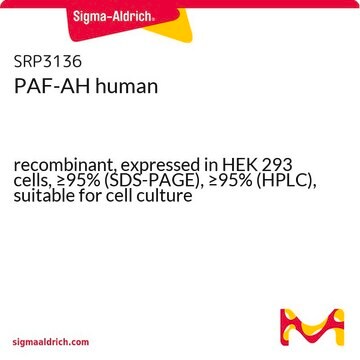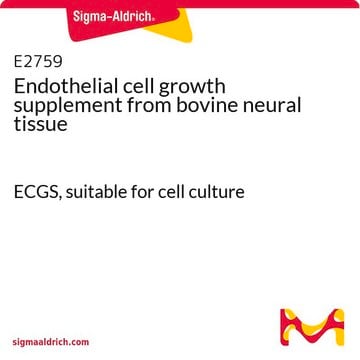P4904
β-Acetyl-γ-O-hexadecyl-L-α-phosphatidylcholine hydrate
≥98%
Sinónimos:
1-Hexadecyl-2-acetyl-sn-glycero-3-phosphocholine, 1-O-Palmityl-2-acetyl-sn-glycero-3-phosphocholine monohydrate, 2-Acetyl-1-hexadecyl-sn-glycero-3-phosphocholine, 3-sn-Phosphatidylcholine, 1-hexadecyl-2-acetyl, PAF(C16), Platelet activating factor
About This Item
Productos recomendados
Quality Level
assay
≥98%
form
powder
storage temp.
−20°C
SMILES string
O.CCCCCCCCCCCCCCCCOC[C@H](COP([O-])(=O)OCC[N+](C)(C)C)OC(C)=O
InChI
1S/C26H54NO7P.H2O/c1-6-7-8-9-10-11-12-13-14-15-16-17-18-19-21-31-23-26(34-25(2)28)24-33-35(29,30)32-22-20-27(3,4)5;/h26H,6-24H2,1-5H3;1H2/t26-;/m1./s1
InChI key
HFMSDOHEENWULV-UFTMZEDQSA-N
¿Está buscando productos similares? Visita Guía de comparación de productos
Application
- to study its effects on phagocytic activity and production of superoxide anion in equine alveolar macrophage and blood neutrophils
- to study its protective effects against cisplatin-induced cell death in a human melanoma cell line in vitro
- to determine its effects on cervical ripening and leukocyte infiltration in rat models
Biochem/physiol Actions
Storage Class
11 - Combustible Solids
wgk_germany
WGK 3
flash_point_f
Not applicable
flash_point_c
Not applicable
ppe
Eyeshields, Gloves, type N95 (US)
Elija entre una de las versiones más recientes:
¿Ya tiene este producto?
Encuentre la documentación para los productos que ha comprado recientemente en la Biblioteca de documentos.
Los clientes también vieron
Nuestro equipo de científicos tiene experiencia en todas las áreas de investigación: Ciencias de la vida, Ciencia de los materiales, Síntesis química, Cromatografía, Analítica y muchas otras.
Póngase en contacto con el Servicio técnico








